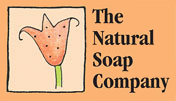
![]() View Shopping Basket (empty)
View Shopping Basket (empty)

Soap comes from a chemical reaction between various oils and fats and caustic soda (lye or NaOH), called saponification. Commercial soap is usually produced from tallow and other fats plus a variety of synthetic compounds which are added to produce the desired lather, texture and hardness of the finished bar. The mixture is boiled at high temperatures with the caustic solution until the process of saponification takes place; soap is the end product. The soap is then grated very finely (milled) and sent through a machine which compacts the soap shreds very tightly to produce a hard, polished bar. However, more additives are needed to give the soap the required amount of plasticity and to prevent the soap from sticking to the rollers of the milling machine.
When fats, oils and lye are mixed, the other product produced besides soap is glycerin. During the manufacture of commercial soaps, the glycerin produced is either washed away with the other waste products, or it is separated out and sold on to the cosmetics, food or explosives (think nitro-glycerin!) industries. This is an enormous loss - glycerin is a natural moisturiser for the skin, and the removal of glycerin during the commercial production of soap is one of the reasons why commercial soaps can often be so drying in use.
In our cold-process soapmaking method the basic mixture of vegetable oils and fats, sodium hydroxide, water, natural nutrients and essential oils is stirred together. No additional heat is supplied apart from the gentle heat needed to melt the oils at the start of the process and the glycerin is stirred back into the soap as the saponification reaction takes place. This means that our handmade soaps retain all the glycerin, making superior and gentle bars of soap.
We use simple, everyday ingredients in our soaps. Depending on the type of soap we want to make, our soaps will contain a mixture of ingredients drawn from the following list: purified water, olive, coconut and palm oils, other fixed oils such as apricot kernel, avocado, jojoba, hemp or sweet almond, nutrients such as shea butter, beeswax and cocoa butter, essential oils for their glorious scents and a range of pigments for colour. Often we add other ingredients, such as powdered flowers or leaves, oatmeal, honey, kaolin or fullers earth.
It is the coconut oil in our soaps that produces the luxurious lather. When you're washing, turn the bar a few times in your hands to release the lovely, soft, fluffy bubbles that are the hallmark of coconut oil in a soap - you'll find they are softer and smoother than those of a typical mass-produced soap.
You will find details of all the soaps we currently make in our on-line shop.
A lovely citrus scent (made up of a blend of nine essential oils) and the addition of shea butter and apricot kernel oil makes this soap a pleasure to use.
NB This soap is palm oil free
A beautiful soap! The colour is aqua blue, with small chunks of white scattered through it. The scent is wonderfully fresh - lavender, juniper needle and lemongrass essential oils combine to evoke a Mediterranean atmosphere. Lie back and enjoy!
NB This soap is palm oil free
A smooth light body lotion formulated with light coconut and grapeseed oils. Scented with beautiful and relaxing lavender essential oil to complement our Lavender Plus and White Lavender soaps.
2d Maryland, Wells next the Sea, Norfolk NR23 1LY, UK
Telephone 01328 711717
E-mail
Website, images and text Copyright ©1998-2020 The Natural Soap Company Limited.